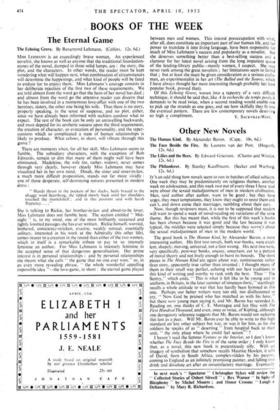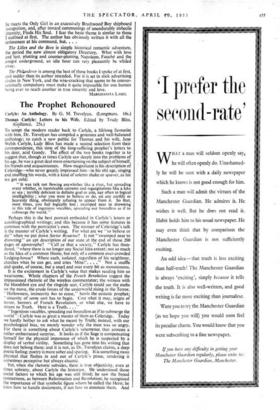Other New Novels
The Human Kind. By Alexander Baron. (Cape. 10s. 6d.) The Philanderer. By Stanley Kauffmann. (Seeker and Warburg. 12s. 6d.) tr's an odd thing how novels seem to run in batches of allied subjects. One week they may be predominantly on religious themes, another week on adolescence, and this week two out of every three 1 have read were about the sexual maladjustment of men in modern civilisation. Men, said author after author, want to be good ; but they have urges, they meet temptations, they know they ought to resist them and can't, and down come their marriages, tumbling about their ears.
Now, though reviewers must, it is not to be supposed that readers will want to spend a week of novel-reading on variations of the same theme. But this has meant that, while the first of this week's books has been chosen because it was good and the last because it was typical, the middles were selected simply because they weren;t about the sexual maladjustment of men in the modern world.
The good book is The Hainan Kind, by Alexander Baron, a most interesting author. His first two novels, both war-books, were excel- lent, shapely, moving, universal, not a foot wrong. His next two were, very specifically, post-war books, uneasy, uncertain, cut to a pattern of moral theory and not lively enough to burst its bounds. The short pieces in The Human Kind are again about war, reminiscence rather than story, apparently true rather than invented ; I thought many of them in their small way perfect, echoing with our best traditions in this kind of writing and worthy to rank with the best. Thus The Sentry," which ends, " This is what it felt like to be young and in uniform, in Britain, in the later summer of nineteen-forty," startlingly recalls a whole attitude to war that has hardly been hymned in this one. Perhaps our better writers were too old, too disillusioned to cry, " Now God be praised who has matched- us with his hour," but there were young men saying it, and Mr. Baron has recorded it. Reading on, one thinks of C. E. Montague and Ian Hay with The First Hundred Thousand, and even, once or twice, of Kipling, although one derogatory reference suggests that Mr. Baron would not welcome this last as a peer. Will -Mr. Baron ever be able to write to this high standard onlny other subject but war, or was it for him, as for the soldiers he speaks of as " deserting " from hospital back to their unit, " the only place where he could feel secure." ? I haven't read the famous Venture to the Interior, so I don't know whether The Face Beside the Fire is of the same order ; I only know that, as a novel, this new book is pretentiously silly. With an imagery of symbolism that somehow recalls Maurice Hewlett, it tells of David; born in South Africa, complex-ridden by his parents, coming to England as an infinitely promising painter, and falling into drink and dissolute art after an unsatisfactory marriage. Eventually he meets the Only Girl in an excessively Brushwood-Boy shipboard recognition, and, after inward communings of unendurably imbecile intensity, Finds His Soul. I fear the basic theme is similar to those I outlined at first. The author has obviously written it with all the seriousness at his command, but. . . .
The Lilies and the Bees is simple historical romantic adventure, the period the now almost obligatory Directory. What with love and lust,- plotting and counter-plotting, Napoleon, Fouche and the emigre underground, an idle hour can very pleasantly be whiled away.
The Philanderer is among the best Of those books I spoke of at first, and sadder than its author intended. For it is set in slick advertising circles in New York, and the wise-cracking that seems to be conver- sationally compulsory must make it quite impossible for one human being ever to reach another in true sincerity and love.
MARGHANITA LASKI.



































 Previous page
Previous page